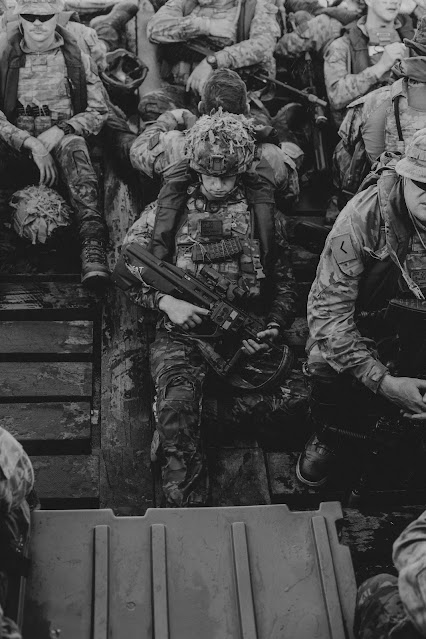The heroic Black WWII soldiers who kept Allied front lines supplied This article delves into the heroic and overlooked contributions of Black soldiers during World War II, focusing on their role in the Red Ball Express, a vital supply chain that kept the Allied front lines stocked with fuel, ammunition, food, and medical supplies. It examines the origins, operations, impact, and aftermath of the Red Ball Express, and sheds light on the discrimination and segregation that Black soldiers faced in the US Army, both during and after the war. It also highlights the legacy of the Red Ball Express and its significance for understanding the history of race, war, and logistics.
The heroic Black WWII soldiers who kept Allied front lines supplied
World War II was a pivotal moment in world
history, and its impact can still be felt today. It was a global conflict that
involved millions of soldiers, civilians, and resources from many countries and
continents. Yet, despite its vast scope and scale, some of the most significant
and inspiring stories of the war remain untold or overlooked. One of those
stories is the heroic and often forgotten role that Black soldiers played in
the Allied victory, particularly in the logistics and supply chain that kept
the front lines fed, fueled, and armed. In this article, we will explore the
history of the Red Ball Express, a vital and risky convoy system that transported
essential supplies from Normandy to the Allied forces in France, Belgium, and
Germany. We will examine the origins, operations, impact, and aftermath of the
Red Ball Express, and shed light on the challenges and contributions of the
Black soldiers who ran it. We will also discuss the discrimination and
segregation that Black soldiers faced in the US Army, both during and after the
war, and the legacy of the Red Ball Express for understanding the history of
race, war, and logistics. By doing so, we hope to honor the bravery and
sacrifice of the Black soldiers who fought and served for their country, even
when their country did not always serve them.
The origins and operations of the Red Ball Express
The Red Ball Express was created in August 1944, after the breakout from Normandy, when the Allied armies faced a logistical crisis. They needed to move fuel, ammunition, food, and medical supplies to their troops, who were advancing faster than expected, but the existing roads and railroads were inadequate or destroyed by German resistance. To solve this problem, the US Army established a convoy system that used the main highways of France as one-way routes for trucks that carried supplies day and night, without stopping or sleeping. The drivers had to endure long and perilous journeys, often in bad weather and under enemy fire, and maintain the vehicles by themselves. The priority was to get the supplies to the front lines as quickly as possible, regardless of efficiency or safety.
The Red Ball Express was named after the red ball symbol that marked the route for the convoys. The symbol was chosen by Lieutenant Colonel John M. Crouchley, Jr., who was the commander of the 57th Transportation Battalion, which was responsible for the operation. The drivers came from various units, but most of them were African Americans, who were drafted or volunteered to serve in segregated companies or battalions. They faced many challenges, both on and off the road. They had to cope with racism, lack of training, and inadequate equipment. They also had to deal with the hostility or indifference of the French civilians, who were not always friendly or grateful to the American soldiers. Nevertheless, the drivers persevered and delivered the goods, often beyond their call of duty.
The impact and aftermath of the Red Ball Express
The Red Ball Express was a remarkable feat of logistics and bravery, that helped the Allies to win the war. According to some estimates, the convoys transported over 400,000 tons of supplies, in more than 70,000 trips, during the 82 days of the operation. The supplies range from gasoline and diesel to tires and spare parts, from rations and water to medical kits and blood plasma. The convoys also evacuated wounded soldiers and prisoners of war, and carried mail and newspapers to boost the morale of the troops. The Red Ball Express became a symbol of American determination and ingenuity, and a source of inspiration for the black soldiers who served in it. It challenged the racial stereotypes and prejudices of the time, and proved that black men could be skilled and loyal soldiers, who deserved respect and recognition.
However, the legacy of the Red Ball Express was not all positive. The operation exposed the flaws and failures of the US Army's logistics and supply system, and the unequal treatment of black and white soldiers. The Red Ball Express was a temporary solution to a long standing problem, and it did not solve the underlying issues of discrimination and segregation in the military. After the war, many Black soldiers who had served in the Red Ball Express or other units faced discrimination and injustice when they returned to civilian life. They did not receive the same benefits or opportunities as white veterans, and their contributions were often ignored or forgotten by the mainstream media and history books. It was only in recent years that the red
FAQs:
Q: What was the Red Ball Express?
A: The
Red Ball Express was a convoy system that transported vital supplies from
Normandy to the front lines in France, Belgium, and Germany during World War
II.
Q: Who ran the Red Ball Express?
A: The
drivers who ran the Red Ball Express were mostly African American soldiers who
served in segregated companies or battalions.
Q: Why was the Red Ball Express important?
A: The
Red Ball Express was important because it enabled the Allies to sustain their
advance and victory in Europe by keeping their troops supplied with fuel,
ammunition, food, and medical supplies.
Q: What challenges did the drivers of the Red Ball Express face?
A: The
drivers of the Red Ball Express faced many challenges, including racism, lack
of training, inadequate equipment, enemy fire, bad weather, and hostility from
French civilians.
Q: What was the legacy of the Red Ball Express?
A: The legacy
of the Red Ball Express was mixed. It was a remarkable feat of logistics and
bravery that challenged racial stereotypes and prejudices, but it also exposed
the flaws and failures of the US Army's logistics and supply system, and the
unequal treatment of black and white soldiers. It remains a significant and
inspiring story of American history and the struggle for equality.
Sources
Smithsonian Magazine: https://www.smithsonianmag.com/history/the-black-wwii-soldiers-who-spirited-supplies-to-the-allied-front-line-180979886/
National Museum of African American History and Culture: https://nmaahc.si.edu/blog-post/red-ball-express-moving-supplies-and-shifting-perceptions
The New York Times: https://www.nytimes.com/2021/02/18/us/black-history-month-red-ball-express.html
HistoryNet: https://www.historynet.com/red-ball-express-unsung-lifeline-allies.htm




